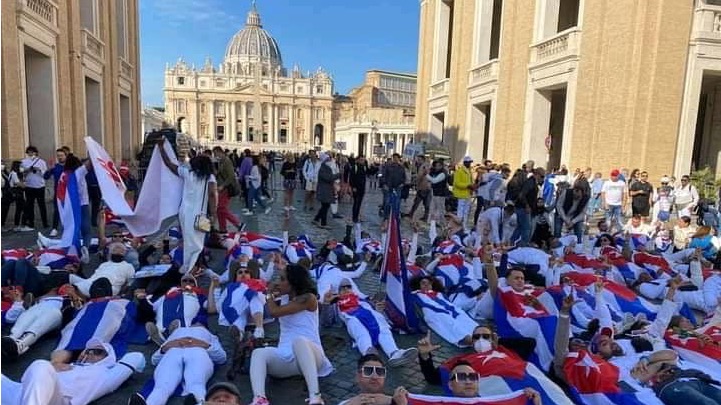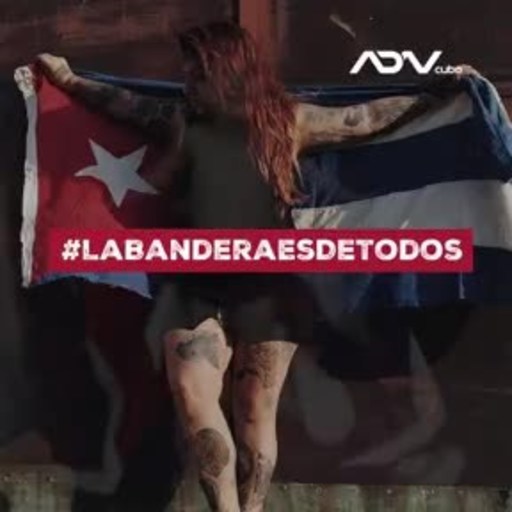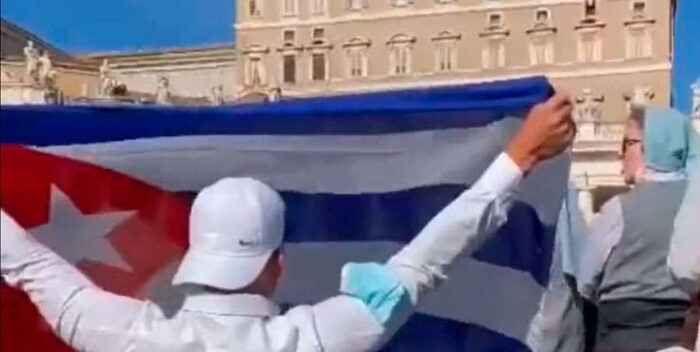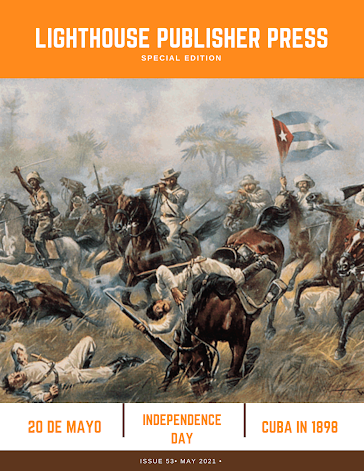LPP ISSUE 8 OCTOBER 2021
Vatican Police confiscated Cuban flags during Pope Francis mass

The Vatican police took the flag from a Cuban who was listening to the Angelus Mass officiated by Pope Francis this Sunday in the Plaza de San Pietro. The young man was standing silently with the flag open on his chest, and was approached by several security guards who took the flag from him.
As detailed CybercubaHundreds of Cubans residing in Italy gathered today at the doors of the Vatican as a sign of support for the call for a large mobilization against the Castro regime scheduled for November 15 on the island.
However, sOnly 50 were allowed access and he warned them that they will not admit slogans or flags. “Without slogans or posters, without flags and only fifty people can enter” were the conditions imposed by the Vatican City through the Cardinal, a participant clarified to CiberCuba.
“We understand the slogans and the posters, but why can’t the flag be carried,” he questioned.
The self-convened Cubans explained that they were not trying to demonstrate, but simply to show the flags during the mass to make the situation on the island visible.

A portal report Cubanet He showed that after the mass the Cubans shouted: “If Cuba is in the street, we too”, in support of those who will come out to face the repression of the regime next 15N. They also chanted “No one pays us, we are not terrorists” and “We are all children of God.”
During the rally, denounced that more than 500 protesters from the July 11 protests continue behind bars on the island for exercising their rights during the historic protests that rocked the country this summer.

In recent days, in fact, it became known that the Castro justice of the Municipal Popular of San José de las Lajas, a town 35 kilometers from Havana, imposed on Roberto Pérez Fonseca, 38, the “joint and only sanction to serve 10 years” in prison for the crimes of contempt, attack, public disorder and instigation to commit a crime, indicates the sentence dated October 6 and to which the AFP news agency had access, after his family was notified this week. This is the highest sentence imposed on a detainee related to the July 11 protests in Cuba.

The sentence “is excessive and violates all guarantees of due process,” Laritza Diversent, director of the human rights NGO Cubalex, told AFP, indicating that it is the longest sentence applied for these demonstrations.
The convict’s mother, Liset Fonseca, believes that the real reasons for the long sentence are that his son tore a photograph of the late dictator Fidel Castro, and that he verbally confronted García Montero when he detained another young man. “Breaking the picture, that cannot be forgiven. They had to do something that was a great lesson, “says the woman, anticipating that they will appeal the sentence.
The demonstrations on July 11 and 12 in 50 cities shouting “Freedom” and “We are hungry,” left one dead, dozens injured and 1,130 detainees, according to Miami-based Cubalex. More than 560 remain in prison.
Now with the call for November 15 fears of more repression grew up. The fact is that the Cuban dictatorship has denied permission to hold that march, which it considers “illegal”, threatens to accuse them of crimes punishable by economic sanctions and deprivation of liberty for three months to a year.
The objective of the peaceful march is to demand respect for the rights and release of political prisoners, among other issues.
KEEP READING:
The US warned the Cuban dictatorship that it will impose more sanctions if it persecutes the promoters of the opposition mobilization
The Cuban dictatorship prohibited the opposition demonstration called for November 15
The Cuban dictatorship threatened the organizers of an opposition mobilization on November 15 with “legal consequences”
Despite the prohibition of the Castro dictatorship, the Cuban opposition ratified the demonstration of November 15
Share this:
Video of how they confiscated the Cuban flag at Pope Francis’ mass
The security forces in the Vatican prevented the entry of hundreds of
people with Cuban flags into St. Peter’s Square in a demonstration that
was held during the Angelus mass, officiated by Pope Francis.
One of the Cubans present at that protest, who made a Twitter broadcast of these incidents, indicated that these demonstrations are a request to the pontiff to pronounce on the government of Cuba.
“The least that millions of human beings who are going through a difficult time deserve is that a pronouncement and a request for prayer, that there is conciliation,” said the protester.
Many of the people who attended spoke to the cry of “God, country, life and freedom”
;, as in moments recorded on video via Twitter, where the topic was a trend.TODAY in the Vatican, Cubans ask for solidarity:
“God, Country, Life and Freedom” @Pontifex_es, a prayer for the Cuban people asking for freedom.pic.twitter.com / hUOODjhqjP– Rosa María Payá A. (@RosaMariaPaya) October 24, 2021
Pictures were even broadcast with many of those protesters who, with Caribbean island flags, lay on the floor as a way of peaceful protest.
“Hundreds of Cubans demonstrating in front of the Vatican headquarters, lying on the floor to symbolize the violence of the Cuban dictatorship, in reference to the thousands of disappeared, murdered and tortured by the regime,” said a tweeter who shared those photographs.
Hundreds of Cubans demonstrating in front of the Vatican headquarters, lying on the floor to symbolize the violence of the Cuban dictatorship, in reference to the thousands of disappeared, murdered and tortured by the regime. Some images for the story that has to go around the world. pic.twitter.com/fGpfpl1ymg
– Agustin Antonetti () October 24, 2021
@agustantonetti
Read also
Vatican: the video of the seizure of the Cuban flag at Pope Francis’ mass
Despite the restrictions, one of the people who protested in his petition to the pontiff for Cuba managed to enter the space where the traditional ceremony takes place.
That man, who was filmed while kneeling with the Cuban flag in his hands, saw how the Vatican Police tore and confiscated that symbol during mass.
A person present recorded it in a video that went viral in the midst of the protests that took place in that territory.
The video of when Vatican security withdrew the Cuban flag from a demonstrator while kneeling praying in St. Peter’s Square is viral. It happened today Sunday during the Angelus Mass, officiated by Pope Francis. pic.twitter.com/2pPibRlrVI
– Reinaldo A. Blanco A. (@BlancoCorreo) October 24, 2021
Pope Francis Hangs Out With Fidel Castro

When the bishop of Rome hangs out with one of the world’s most famous Communist revolutionaries, what do the two chat about?
According to Vatican spokesman Frederico Lombardi: “protection of the environment and the great problems faced by today’s world.” On Sunday, Francis and Fidel met for roughly half an hour after the pope celebrated mass in Havana’s Plaza de la Revolución. The meeting wasn’t on the pope’s formal schedule for his trip in Cuba, but it’s not a total surprise that it happened, according to The Guardian’s Stephanie Kirchgaessner.
The two did a book swap, including a bonus CD for Castro. (Perhaps the men of 78 and 89, respectively, haven’t quite embraced mp3s.) The former Cuban president gave the pope a book by a Brazilian priest called Fidel and Religion. Francis returned the favor with several books by the priest Don Alessandro Pronzato and copies of his encyclical on climate change and apostolic exhortation on the gospel—for what it’s worth, that’s Francis’s much celebrated smack-down on greed and capitalism. In his gift, the pope also included writings and recordings of homilies by one of Castro’s childhood priests. Here’s Austen Ivereigh, the author of a biography on Francis, on that gift choice:
In other words, the gift to Fidel of Fr Llorente's book and CD may have been to help El Jefe to come to terms with his past.
— Austen Ivereigh (@austeni) September 20, 2015
It's the kind of thing a priest does for a dying man.
— Austen Ivereigh (@austeni) September 20, 2015

Cubans who were going to attend the Pope’s mass are denied entry to the Vatican
The Vatican denied entry to hundreds of Cubans who wanted to attend mass this Sunday, after receiving information about a possible attack on the Holy See, a participant in the rally told CiberCuba.
Cubans residing in Italy and from other countries went to Vatican City to participate in the Angelus Mass officiated by Pope Francis with the intention of making visible the march of 15N and the situation of political prisoners in Cuba.
However, the Holy See Guard denied them entry to the Plaza de San Pietro and explained that they had received information that the Cubans would carry out an attack in the Plaza de San Pietro.
“This is very hard, incredible, they put up metal barriers to block access”, said to CiberCuba one of the Cubans who has been on hold since 8:00 in the morning local time.
First, they sent the head of the Vatican gendarmerie who explained the reasons for the refusal: “They see it as a hostile act towards the Vatican”said the source in reference to the position of the authorities with the presence of Cubans.
The presenter Alexander Otaola, who traveled to Rome to participate in the rally, asked to speak with a member of the Vatican clergy and the Holy See sent a Cardinal whose name was not specified in this newspaper.
A group of Cubans residing in Italy called a rally at the Vatican for this Sunday, October 24, regarding the march of the November 15 in Cuba, which seeks to make visible the repression on the island and advocate for the release of political prisoners.
Participants will gather in the Plaza San Pietro at 8:00 in the morning to attend the Angelus mass officiated by His Holiness Pope Francis and the presence of hundreds of Cubans is expected.
Cubans are traveling by buses to Rome from various cities on the Italian peninsula and from other countries, as is the case of a representation of the Cuban community in the United States, including the influencer Alexander Otaola.
This morning, the presenter made a live broadcast from the hotel where he is staying in Rome, minutes after his arrival in the Italian capital, not without setbacks. Immigration officers detained him at the airport for no apparent reason, Otaola explained.
At the time of writing this note, and as a prelude to the rally this Sunday, Cubans, Italians and other nationalities that stand in solidarity with the cause of Cuban freedom are in the Plaza de la Madonna Di Loreto demanding the end of the dictatorship on the island.
An Israeli citizen spoke to those present in Hebrew and others spoke in Italian and Spanish to carry the message of what is happening in Cuba in various languages.
The presenter Alexander Otaola also took the microphone and others chanted “Homeland and Life” and “If Cuba is on the street, we too”, among other slogans, in solidarity with those who today suffer harassment and prison after the protests of the 11J on the island.
Sources based in Rome present at the demonstration taking place at this moment, assured CiberCuba that, after the rally in the Piazza de la Madonna Di Loreto, there will be a pilgrimage that will pass through emblematic points of Rome and will culminate in the vicinity of the Italian Parliament.
The objective of this march prior to the concentration in the Vatican this Sunday, October 24, is to bring a clearer message to the citizens of that country through harangues, slogans and posters not allowed in the Plaza de San Pietro.
This weekend’s liturgy honors that of the 15N march with the same clothing label representative of peace and the presence of Cuban flags and initiatives that promote change in Cuba.
More than 1,130 Cubans have been arrested for exercising their right to demonstrate on the island during the anti-government protests last July. Of these, more than 500 remain behind bars and many face prosecution requests for up to 25 years of deprivation of liberty.
Another nod by Pope Francis to Castroism: Vatican police confiscate flags of Cuban dissidents

The Vatican has once again made a new nod to communist dictatorships. This Sunday hundreds of Cubans with flags of their country attended the Angelus Mass officiated by the Pope Francisco in the Plaza San Pedro. The call was a show of support for the mobilization against the Castro regime scheduled for November 15 on the island. What they did not expect is that Vatican Security agents would confiscate their country’s flags when it is very common to see people from all over the world in the square with flags.
“God, country, life and freedom!” Was one of the shouts made by a group of women who were peacefully demonstrating for freedom in Cuba. “Human rights for Cubans!” and “We want Cuba free!” were other slogans.
The Vatican has a Gendarmerie Corps which acts as gendarmerie, police and security force of the Vatican City and the extraterritorial properties of the Holy See, in addition to the already known as Switzerland guard, which protects the Pope within the Holy See. The body is responsible for security, public order, border control, traffic control, criminal investigation, and other general policing tasks.
It was a peaceful demonstration in which the Cubans asked Pope Francis to make a gesture for the thousands of his compatriots who live under the totalitarian boot of Castroism. But this Pope has already made it clear which side he is on, so much so that he recently received praise from none other than the Spanish anticlerical left for his criticism of the Conquest of America.
It should be remembered that in November 2016 the Italian newspaper The Republic published a short interview with Pope Francis to questions from the Italian journalist Eugenio Scalfari in which he said that “the communists were the only ones who thought like the Christians.”
“Are you also referring to a Marxist-type society?” Scalfari asked him. “If anything, it is the communists who think like the Christians,” the Pope replied. «Christ has spoken of a society in which the poor, the weak and the excluded decide. To obtain equality and freedom we must help the people, the poor with or without faith in God, and not the demagogues or the barabbas, “he added.
https://then24.com
Experts fear Cuba is preparing a harsh response to recent protests

U.S. theologians and human rights experts on Cuba worried that any repeat of the widespread protests in Cuba on July 11 may be met with a swift, violent set of state-sponsored reactions.
There were already signals the Cuban government had disseminated a multifaceted action plan July 12 that was to last 72 hours. It included shutting down internet communications, as well as deploying plainclothes-wearing state police and military personnel to squash further protests following July 11's massive turnout, according to Elsie Miranda.
"I am afraid for the people [there] because of their desperation and willingness to die for a chance to live," said Miranda, a professor of theology and director of accreditation for the Association of Theological Schools.
She has led missions to Cuba in conjunction with the Catholic Church there and attended Pope Francis' visit to Cuba in 2015.
A communication that Miranda has seen, written in Spanish and circulating among human rights activists, appeared to detail the Cuban government's nine-point plan to shut down further civic displays of unrest and called for using whatever means necessary to do so, including a large presence of plainclothes police dispatched to mingle among protesters to make arrests.
Miranda, who is normally based in Pittsburgh but is working this summer from Miami, told Catholic News Service in a phone interview the recent protests show a bold new willingness and determination among Cuban youth to stand up to the communist regime and to express that they have nothing to lose now.
But if there isn't a turnaround in the Cuban military, she said, it may end badly for the protesters.
"Unless there is a shift in the military and they turn — and I don't see that happening — this will be a very sad moment in our history," Miranda said, pointing out the hardline leadership of Cuban President Miguel Díaz-Canel is a continuation of Raul Castro's presidency.
"How long can [Díaz-Canel] hold on to power using these methods if there is a slaughter of the people? He has the support of Venezuela, Nicaragua and maybe even Argentina to come into Cuba," she said.
The tone of the July 11 protests in Cuba was wrapped up in a popular Cuban rap song, "Patria y Vida" ("Homeland and Life"). It's a play on words and a new response to the popular slogan of the Cuban Revolution, "Patria o Muerte" ("Motherland or Death").
Patria y Vida - Yotuel , @Gente De Zona , @Descemer Bueno , Maykel Osorbo , El Funky
"I have to believe in miracles and hope for some kind of intervention, but I am afraid there will be a lot of people dying tonight," Miranda added. "The people have reached a point where the value of their life is less to them now than the value of facilitating change.
"There really is a sense that the camel's back is broken and they don't care what the consequences are anymore because if they die, they die heroes."
A poor economic situation in Cuba has reportedly been exacerbated in recent months by the coronavirus pandemic, although it is hard for outsiders to know how significantly the pandemic is impacting the country as a whole.
Cuba claims to have developed a COVID-19 vaccine, and protesters were calling for greater access to vaccines as well as demanding an end to the 62-year dictatorship.
A national coordinator of the Christian Liberation Movement, known as MCL for its initials in Spanish, said thousands of Cubans were demanding freedom and an end to repression and misery.
The group also demanded "the release of political prisoners, the annulment of the repressive laws against freedom, recognition of economic rights of free enterprise for Cubans, and recognition of [the right of] each Cuban — inside and outside the island — to vote and to be elected," it said.
"My view of this is that it is a combination of a dire economic situation owing to the dramatic decline in tourism, loss of economic assistance from Venezuela, and the increasing connectivity of the Cuban population, both domestically and abroad," said Peter Sanchez, a professor emeritus of comparative politics at Loyola University Chicago, who has conducted field research in Cuba. He made the comments in an email to CNS.
News reports said the unprecedented protests in Cuba have taken place not only in Havana but in 14 other Cuban cities. They were mirrored by a vocal street protest in Miami's Little Havana neighborhood late afternoon July 11.
Advertisement
Miranda, who attended the Miami event, which took place around the city's popular Versailles Cuban Restaurant, said protesters there and those calling in to Miami's Spanish radio stations were asking President Joe Biden to intervene.
Others were still calling for former President Donald Trump to be the agent of change for Cuba, she said, adding that the former president is still seen by Miami's Cuban-Americans as supportive of regime change in Cuba.
But Miranda said the Catholic Church and Pope Francis — given the church's relative independence in Cuba — should seize the moment to make a new gesture and express support of the Cuban youth protests.
"I was there [in Havana] for the papal visit with Francis when the youth were telling him that we need to have a future and have no place to practice our trade; the pope needs to exercise his leadership in Cuba in a more forceful way and I think he has been a little too slow," she said.
"But now we need leadership — strong, forceful, revolutionary leadership that stands up to these abusive powers and oppressive regimes," she added. "I am concerned that it may come too late."
In Colorado, Miguel De La Torre, professor of social ethics and Latinx studies at the University of Denver's Iliff School of Theology, has led research delegations to Cuba. He said he was cautiously watching to see what happens in Cuba in the days ahead in light of how past challenges to the Cuban regime over the years have been stifled.
He pointed out a 2020 clampdown of the San Isidro artist movement in Havana during which the government forcibly detained and then released protesters seeking greater freedoms.
"The fact that the people are crying out for life is very significant. It is not just protest for the sake of protest, it is calling for something significant," De La Torre said, adding that if the pandemic is hitting the country hard, then it may be pushing the Cuban people past the boiling point.
"The Cuban government is calling for bloodshed asking that true revolutionaries take back the streets. The Cubans in the U.S. are calling for bloodshed, demanding the U.S. government take back the island," he said. "Neither a U.S. invasion nor a civil war are the answers."
"At a time like this, maybe we should listen to those who are protesting in the streets — risking everything — and pay attention to what they — and they alone — want," he added. "They are not pawns to be manipulated by the right or the left — instead their free agency must be respected and supported during these momentous events."
Hundreds of Cubans protest outside the Vatican after being prevented from entering Pope Francis’ congregation

More than a hundred Cubans protested outside the Vatican this Sunday After the Guardian of the Holy See blocked access to Pope Francis’ Angel’s Prayer, they sought to condemn the regime’s repression. Announced by Radio Television Marty.
One of the people gathered at the Vatican, Lazaro Mireles, coordinator of the Acts for Democracy, Posted pictures On their social networks The roaring of the Cubans can be seen as a form of protest.
“We kneel in front Vatican Why didn’t they let us pass, Our faith is unworthy of hearing according to the Catholic Church. This is how they divide us, those who peacefully want freedom and human rights for our people, ”the activist wrote on Twitter.
He knelt with the flag of a Cuban island that was able to enter the Plaza de San Pedro Pope Francisco Performed by Angeles, Several police officers then took it from him.
Italian news agency ANSA Report That approximately 500 Cubans from different parts of the world went to bed en The way of compromise After seeing that they were denied access to the square.
“They are all wrapped in the flags of CubaAlso, create the ‘L’ sign with their fingers to hear ‘freedom’, ”the company added.
Cubans, among them YouTuber Alexander Ottola, They went to the Holy See to request a report from Pope Francis on the condition of the island, Marked by a severe economic crisis and an increase Oppression From the regime to the citizens.
Sunday after July 11th Francisco “was close to the loving Cuban people during these difficult timesEspecially from the most vulnerable families. After praying to Angeles, I pray to the Lord to help him build peace, dialogue and unity in a more just and fraternal society.
“I ask that all of the people of Quito be handed over to the maternal care of the Virgin Mary of Corridor del Cobre. She will accompany them on this journey,” he added.









Comments
Post a Comment